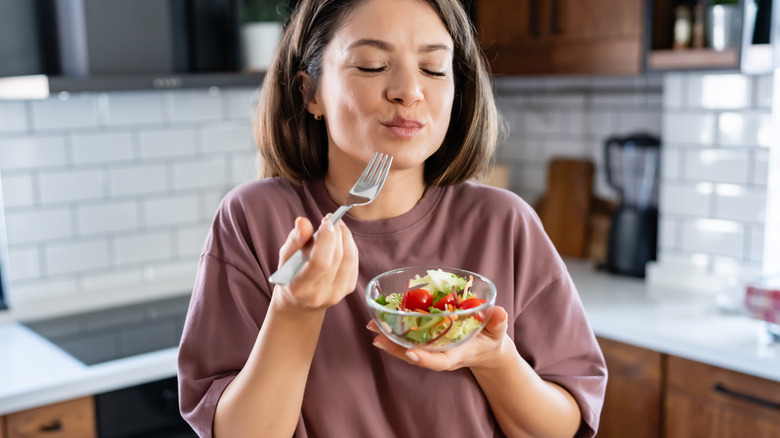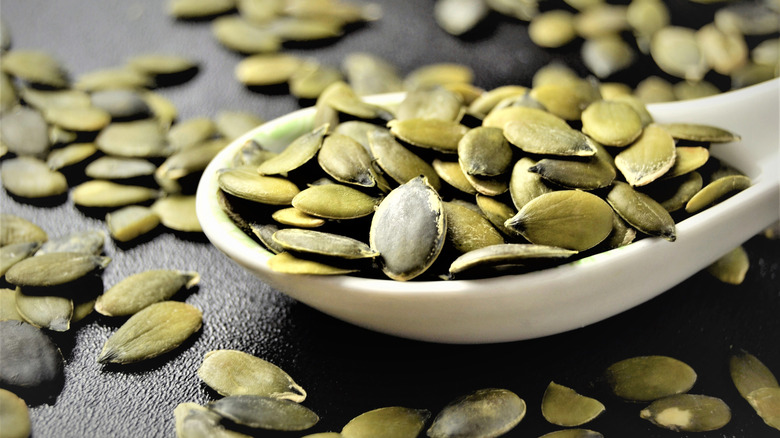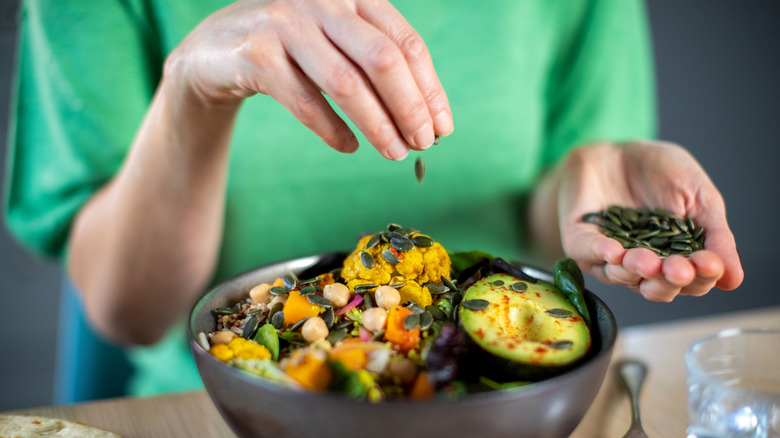A Unique Seed Has More Protein Than An Egg And Can Help You Sleep (But There's A Catch)
Protein plays a key role in many of your body's functions, including building muscle, serving as chemical messengers, and producing antibodies that fight off infection. Although your protein needs vary according to your age, activity level, and weight, it's best to spread your protein intake throughout the day rather than eating a ton of protein at night. You could start your day with eggs to help you feel a little more full until lunch and add some healthy high-protein snacks to keep your blood sugar from spiking.
Pumpkin seeds are a great snack option, and registered dietitian Angel Luk tells Health Digest that a serving of pumpkin seeds provides more protein than an egg. "In a quarter cup of pumpkin seeds, there's about 10 grams of plant-based protein," she said. "In one large egg, there's about 7 grams of animal-based protein." However, Luk noted that pumpkin seeds don't have enough of the essential amino acids to be considered a "complete" protein. Yet pumpkin seeds surpass eggs in two nutrients that can help you sleep.
Nutrients in pumpkin seeds that may help with sleep
Luk says that an ounce of pumpkin seeds has 168 milligrams of magnesium compared to the 6 milligrams in a large egg. Magnesium may help improve the duration and quality of your sleep, according to a 2023 meta-analysis in Biological Trace Element Research. Observational studies (where people report their magnesium intake and sleep) suggest that magnesium is linked with sleep quality, but experimental studies using magnesium supplements have shown conflicting results on sleep disorders.
Even though pumpkin seeds don't have all of the essential amino acids that an egg has, both pumpkin seeds and eggs have the amino acid tryptophan. Tryptophan helps your body make serotonin and melatonin, two neurotransmitters that contribute to better sleep. A 2020 review in Nutrients found that after eating tryptophan-rich foods, healthy adults slept longer, fell asleep more easily, and woke up fewer times throughout the night. When you're depleted of tryptophan, you'll spend less time in restorative sleep and experience more sleep disruptions. One egg provides 84 milligrams of tryptophan, but an ounce of pumpkin seeds has 163 milligrams per ounce.
Some considerations when adding pumpkin seeds to your diet
Pumpkin seeds make a great snack on their own, but you can complete this protein source if you add soy or other legumes to pumpkin seeds. Luk says that pumpkin seeds are good sources of non-heme iron. "This means that in order to absorb the iron better, it should be consumed with vitamin C-rich foods," she said. Try roasted pumpkin seeds over a citrus salad to add some texture and crunch.
You'll find 5 grams of fiber in an ounce of pumpkin seeds to help you feel full throughout the day. Luk says there might be some drawbacks, such as gas, bloating, and constipation, especially if you're not used to eating fiber. "If someone is new to pumpkin seeds, perhaps stick with just a one-ounce serving to get used to the high fiber content," she said. "Remember to drink more water, so the body adjusts more quickly and benefits from all the protein, iron, fiber, and, of course, flavor too."



